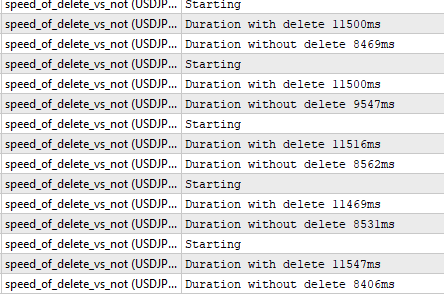a_thing.set_name("EURUSD").set_volume(55);//not using the pointer returnedYou are using the returned pointer. Same as a_thing.set_volume(…);
i wonder what the "stack" limit is 😄
#define F set_volume(1) int OnInit() { //--- thing_with_stackable_methods a_thing; a_thing.set_name("EURUSD").set_volume(55); a_thing.set_name("GBPUSD"); a_thing.set_name("EURUSD").set_volume(11).reset().set_name("BTC").set_volume(101); Print(a_thing.get_name()+" "+IntegerToString(a_thing.get_volume())); a_thing.F.F.F.F.F.F.F.F.F.F.F.F.F.F.F.F.F.F.F.F.F.F.F.F.F.F.F.F.F; delete(GetPointer(a_thing)); //--- return(INIT_SUCCEEDED); }
delete(GetPointer(a_thing));This is wrong. You did not allocate a_thing with new, you do not de-allocate it with delete.
I've been doing this in structures containing class arrays and classes containing class arrays in their constructor / destructor too . It could be redundant as well
class item{ int value; }; class item_holder{ item my_items[]; item_holder(void){reset();} ~item_holder(void){reset();} void reset(){ for(int i=0;i<ArraySize(my_items);i++){ delete(GetPointer(my_items[i])); } ArrayFree(my_items); } };
Lorentzos Roussos #: I've been doing this in structures containing class arrays and classes containing class arrays in their constructor / destructor too . It could be redundant as well
item my_items[]; ⋮ delete(GetPointer(my_items[i]));
Again, this is wrong. my_items[] contains item's, not pointers to them. You did not allocate them with new, you do not delete them.
hmm there seems to be a speed gain too without my mistake as the array grows in size , nice . I must re-study some things evidently
class an_item{ double value; public: an_item(void){value=0.0;} void set(double _v){value=_v;} }; class items_with_delete{ an_item items[]; public: items_with_delete(void){reset();} ~items_with_delete(void){reset();} void reset(){ for(int i=0;i<ArraySize(items);i++){delete(GetPointer(items[i]));} ArrayFree(items); } void add_from_array(double &array[],int times_to_repeat){ for(int i=0;i<times_to_repeat;i++){ reset(); ArrayResize(items,ArraySize(array),0); for(int j=0;j<ArraySize(array);j++){items[j].set(array[j]);} } } }; class items_no_delete{ an_item items[]; public: items_no_delete(void){reset();} ~items_no_delete(void){reset();} void reset(){ ArrayFree(items); } void add_from_array(double &array[],int times_to_repeat){ for(int i=0;i<times_to_repeat;i++){ reset(); ArrayResize(items,ArraySize(array),0); for(int j=0;j<ArraySize(array);j++){items[j].set(array[j]);} } } }; int OnInit() { //--- EventSetTimer(1); //--- return(INIT_SUCCEEDED); } void OnTimer(){ Print("Starting"); EventKillTimer(); int array_items=100000,rounds=1000; double array[]; ArrayResize(array,array_items,0); for(int i=0;i<array_items;i++){array[i]=i;} //with delete uint starttime=GetTickCount(); items_with_delete iwd; iwd.add_from_array(array,rounds); uint endtime=GetTickCount(); long duration=endtime-starttime; if(endtime<starttime){duration=(endtime+UINT_MAX)-starttime;} Print("Duration with delete "+IntegerToString(duration)+"ms"); //without delete starttime=GetTickCount(); items_no_delete ind; ind.add_from_array(array,rounds); endtime=GetTickCount(); duration=endtime-starttime; if(endtime<starttime){duration=(endtime+UINT_MAX)-starttime;} Print("Duration without delete "+IntegerToString(duration)+"ms"); }

You are missing trading opportunities:
- Free trading apps
- Over 8,000 signals for copying
- Economic news for exploring financial markets
Registration
Log in
You agree to website policy and terms of use
If you do not have an account, please register
This is a noob question.
I wont run into any walls if i deploy methods this way will i ?
(per the convenience of being able to call these methods without using the returned pointer , like they were void type)
Tx